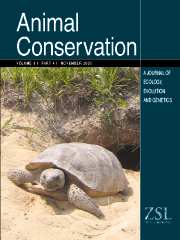Crossref Citations
This article has been cited by the following publications. This list is generated based on data provided by
Crossref.
van Aarde, Rudi
Whyte, Ian
and
Pimm, Stuart
1999.
Culling and the dynamics of the Kruger National Park African elephant population.
Animal Conservation,
Vol. 2,
Issue. 4,
p.
287.
Milewski, A. V.
and
Diamond, R. E.
2000.
Why are very large herbivores absent from Australia? A new theory of micronutrients.
Journal of Biogeography,
Vol. 27,
Issue. 4,
p.
957.
O'Connell-Rodwell, Caitlin E
Rodwell, Timothy
Rice, Matthew
and
Hart, Lynette A
2000.
Living with the modern conservation paradigm: can agricultural communities co-exist with elephants? A five-year case study in East Caprivi, Namibia.
Biological Conservation,
Vol. 93,
Issue. 3,
p.
381.
Chapman, Andrew P.
Brook, Barry W.
Clutton-Brock, Tim H.
Grenfell, Bryan T.
and
Frankham, Richard
2001.
Population viability analyses on a cycling population: a cautionary tale.
Biological Conservation,
Vol. 97,
Issue. 1,
p.
61.
Fayrer-Hosken, R. A.
Grobler, D.
van Altena, J. J.
Bertschinger, H. J.
and
Kirkpatrick, J. F.
2001.
African elephants and contraception.
Nature,
Vol. 411,
Issue. 6839,
p.
766.
Pimm, Stuart L.
and
van Aarde, Rudi J.
2001.
African elephants and contraception.
Nature,
Vol. 411,
Issue. 6839,
p.
766.
Owen-Smith, Norman
2002.
A metaphysiological modelling approach to stability in herbivore–vegetation systems.
Ecological Modelling,
Vol. 149,
Issue. 1-2,
p.
153.
Owen-Smith, R. Norman
2002.
Adaptive Herbivore Ecology.
Hutchins, Michael
and
Keele, Mike
2006.
Elephant importation from range countries: ethical and practical considerations for accredited zoos.
Zoo Biology,
Vol. 25,
Issue. 3,
p.
219.
van Aarde, Rudi J.
and
Jackson, Tim P.
2007.
Megaparks for metapopulations: Addressing the causes of locally high elephant numbers in southern Africa.
Biological Conservation,
Vol. 134,
Issue. 3,
p.
289.
Smit, I. P. J.
Grant, C. C.
and
Whyte, I. J.
2007.
Landscape‐scale sexual segregation in the dry season distribution and resource utilization of elephants in Kruger National Park, South Africa.
Diversity and Distributions,
Vol. 13,
Issue. 2,
p.
225.
Woolley, Leigh-Ann
Millspaugh, Joshua J.
Woods, Rami J.
Janse van Rensburg, Samantha
Mackey, Robin L.
Page, Bruce
Slotow, Rob
and
Brooks, Robert
2008.
Population and Individual Elephant Response to a Catastrophic Fire in Pilanesberg National Park.
PLoS ONE,
Vol. 3,
Issue. 9,
p.
e3233.
Woolley, Leigh-Ann
Mackey, Robin L.
Page, Bruce R.
and
Slotow, Rob
2008.
Modelling the effect of age-specific mortality on elephant Loxodonta africana populations: can natural mortality provide regulation?.
Oryx,
Vol. 42,
Issue. 01,
Shannon, Graeme
Druce, Dave J.
Page, Bruce R.
Eckhardt, Holger C.
Grant, Rina
and
Slotow, Rob
2008.
The utilization of large savanna trees by elephant in southern Kruger National Park.
Journal of Tropical Ecology,
Vol. 24,
Issue. 3,
p.
281.
Druce, Dave J.
Shannon, Graeme
Page, Bruce R.
Grant, Rina
Slotow, Rob
and
Rands, Sean
2008.
Ecological Thresholds in the Savanna Landscape: Developing a Protocol for Monitoring the Change in Composition and Utilisation of Large Trees.
PLoS ONE,
Vol. 3,
Issue. 12,
p.
e3979.
Valeix, M.
Fritz, H.
Chamaillé‐Jammes, S.
Bourgarel, M.
and
Murindagomo, F.
2008.
Fluctuations in abundance of large herbivore populations: insights into the influence of dry season rainfall and elephant numbers from long‐term data.
Animal Conservation,
Vol. 11,
Issue. 5,
p.
391.
GULDEMOND, ROBERT
and
VAN AARDE, RUDI
2008.
A Meta‐Analysis of the Impact of African Elephants on Savanna Vegetation.
The Journal of Wildlife Management,
Vol. 72,
Issue. 4,
p.
892.
Viljoen, Jozua J.
Ganswindt, André
du Toit, Johan T.
and
Langbauer, William R.
2008.
Translocation stress and faecal glucocorticoid metabolite levels in free-ranging African savanna elephants.
South African Journal of Wildlife Research,
Vol. 38,
Issue. 2,
p.
146.
Thomas, Bindi
Holland, John D.
Minot, Edward O.
and
Chave, Jerome
2008.
Elephant (Loxodonta africana) Home Ranges in Sabi Sand Reserve and Kruger National Park: A Five-Year Satellite Tracking Study.
PLoS ONE,
Vol. 3,
Issue. 12,
p.
e3902.
Schmidtz, David
2008.
Person, Polis, Planet.




